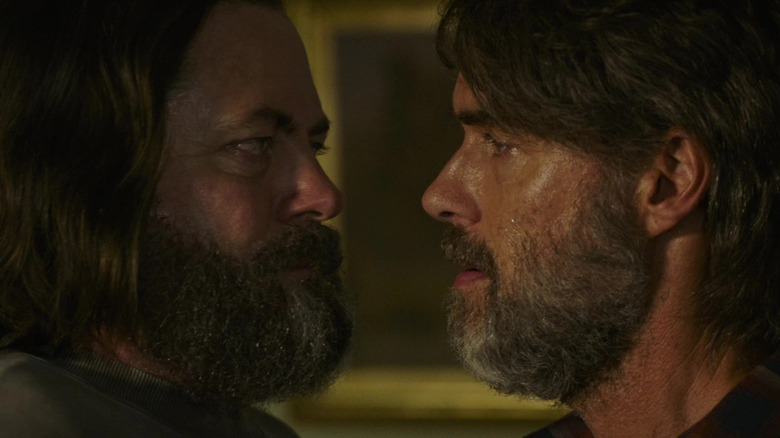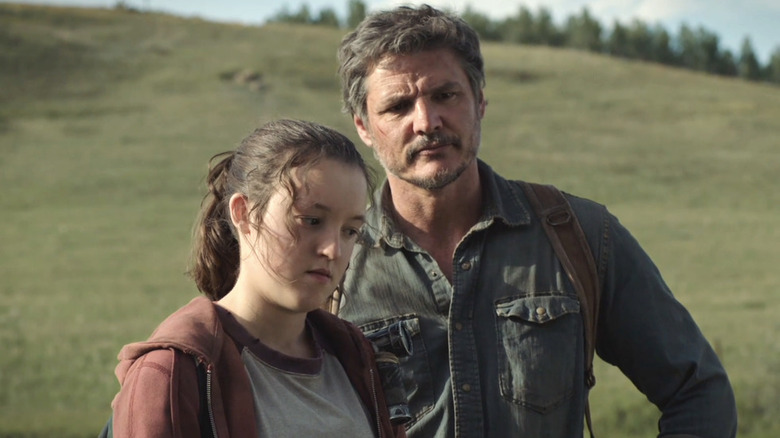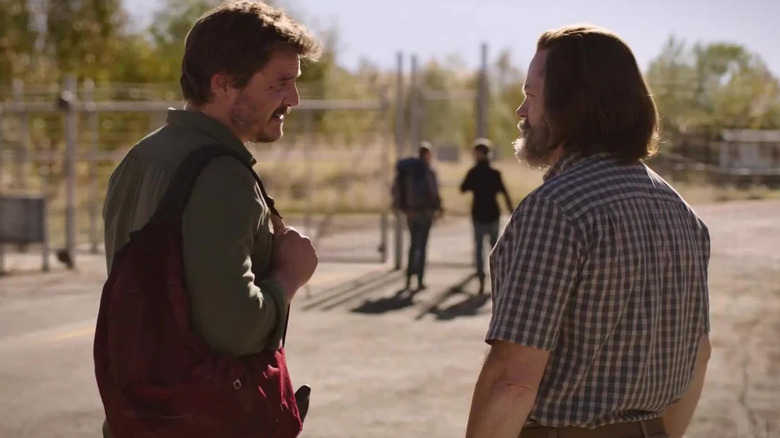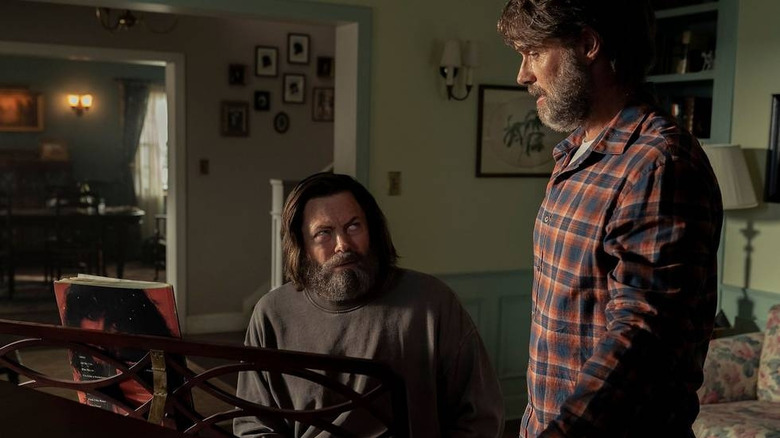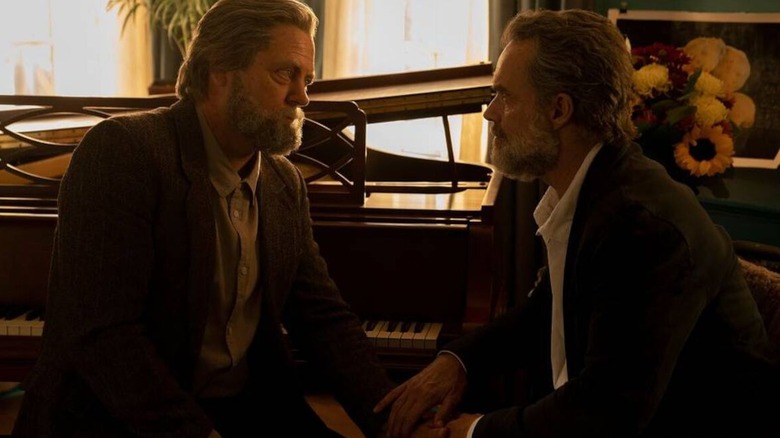How The Last Of Us Episode 3 Compares To The Original Video Game
"The Last of Us" took its longest journey into uncharted territory yet with episode 3, "Long, Long Time." Anchored by the love story of Bill (Nick Offerman) and Frank (Murray Bartlett), we are given little Joel (Pedro Pascal) and Ellie (Bella Ramsey) in this one-episode arc. Even still, the former duo delivered a gut-punch of a performance that distilled the main themes of the game's story into a sweet little capsule.
The only exact reference from the game I could pinpoint in this episode was at the end, when Joel was laying his ground rules with Ellie, wherein she responds "What you say goes." It's the same dialogue from the game, right down to the vocal inflections both characters use. Just about every other nod to the game is similar enough to be identified but different enough to feel special to the show. For example, the final shot of this episode, containing an open window with a gentle breeze blowing the curtains, is a visual reference to the menu screen in the game.
Although it contained the least direct-to-film references from the game, this episode managed to feel the most definitively like the game of the first three episodes.
Painting a fuller picture
As discussed in the previous comparison outlines of episode 1 and episode 2, players of the game are given little info about the dynamics and events of the apocalyptic world outside of anything that affects Joel and Ellie directly. We were given a small amount of world-building this week that once again makes evident the bleakness of life post-Cordyceps.
Joel explained how immediately after Outbreak Day, the government forced people into quarantine zones (QZs) — but noted that there were essentially capacity limits enforced. If there was no more room in a given area, people were executed by the military. Their bodies were left to rot in open-air graves, one of which Ellie stumbles upon with Joel.
This new wrinkle makes the title of the series make that much more sense: the characters we see are lucky to be among the last of humanity. To not only escape infection, but to escape government-sanctioned murder. Fewer people means less opportunity to spread the infection. It's certainly an unsettling plot point considering the reality of the U.S. government's negligence with the COVID-19 pandemic, allowing the most vulnerable (immunocompromised, disabled, poor, marginalized) people to die by barely enforcing mask mandates and other safety measures. Taking this point further, if the government in the series could act as jury and executioner with the "leftovers" outside of QZs, who would FEDRA decide to kill first? Would they perhaps resemble the people most affected by COVID-19, as well?
Similar, not same
But let's get to why you're really here. Was Bill gay in the game, and was Frank his lover? The answer is ... probably, yes.
Players aren't given much about Bill's backstory. He tells Joel rather memorably in the game, "Once upon a time, I had somebody that I cared about. It was a partner. Someone I had to look after. And in this world, that sort of s*** is good for one thing: gettin' ya killed." Ellie later finds a Playgirl magazine at Bill's place. These two things together seemed to be the game writers' subtle way (or not subtle, if you can imagine queer relationships in any story) of indicating that Bill and Frank were romantic partners.
Additionally, the show took Bill and Frank's relationship with Joel and Tess (Anna Torv) further than the game. The game version of Joel only knew Bill, as Frank had already left Bill on bad terms and died by suicide after becoming infected but before Joel and Ellie meet up with Bill.
In contrast, Joel not only knew of Frank in the TV series but had spent time with him at dinners with Bill and Tess prior to going to him for the car battery. The two couples met several years into the pandemic after Frank connected with Tess over the radio.
Even with the additions to his story, Bill's demeanor is consistent across versions. He's survivalist-minded and wary of new people and went to elaborate lengths to protect himself from outside dangers with traps and surveillance. The show's writers used the skeleton of Bill's backstory from the game and gave it a whole body that viewers could resonate more with. He was originally only protecting himself, but by his end, he was protecting so much more.
The heart of it all
Bill serves a very specific purpose in the game and the series. He is a mirror for Joel and a cautionary tale for daring to love in the apocalypse. But I'd argue that the writing of Bill in the show does a better job of capturing the themes at the center of "The Last of Us."
Fans have heard Tess' words multiple times in trailers and previews for the series: "Save who you can save." In this episode, a dying Frank pleads to his hesitant husband Bill to euthanize him with pills in his wine, telling him, "Love me the way I want you to." Throughout this series, characters will be faced with impossible ultimatums about love and sacrifice. Bill tells Joel in his suicide note that his purpose was to save Frank, an idea that Joel will arrive at with Ellie by the end of the first season (assuming the plot aligns with the game). But really, Frank saved Bill. He salvaged within Bill the last, desperate, aching piece of love he had to give. This is why Bill chose to die with Frank rather than live without him. He would rather lose it all than go on without that missing piece. In this hollow world, you clutch at loved ones with a death grip. This love story was a touching example of that idea.
Love over everything
"The Last of Us" envisions a society where love is both paradise and prison to one's sense of self. It can allow you temporary respite from terror, but also may force you to make dreadful decisions in the name of self-preservation. For loners like Joel, Ellie, Bill, and others, surrendering to love also means shackling yourself to another person's emotional baggage — and the dreadful decisions they may make, too.
This episode perfectly encapsulates the unabashed tenderness that made "The Last of Us" one of the most beloved titles of all time. Even though almost nothing in the episode appeared in the game, somehow, it felt just as heartfelt as what players experienced, if not more so. "Long, Long Time" is still a faithful representation of the game because of how excellently it captured the game's essence; it gave us what the game couldn't while still respecting the source material. If there was any doubt about the merit of this story as a television series before this episode, the writing is now on the wall. This adaptation is the real deal.
